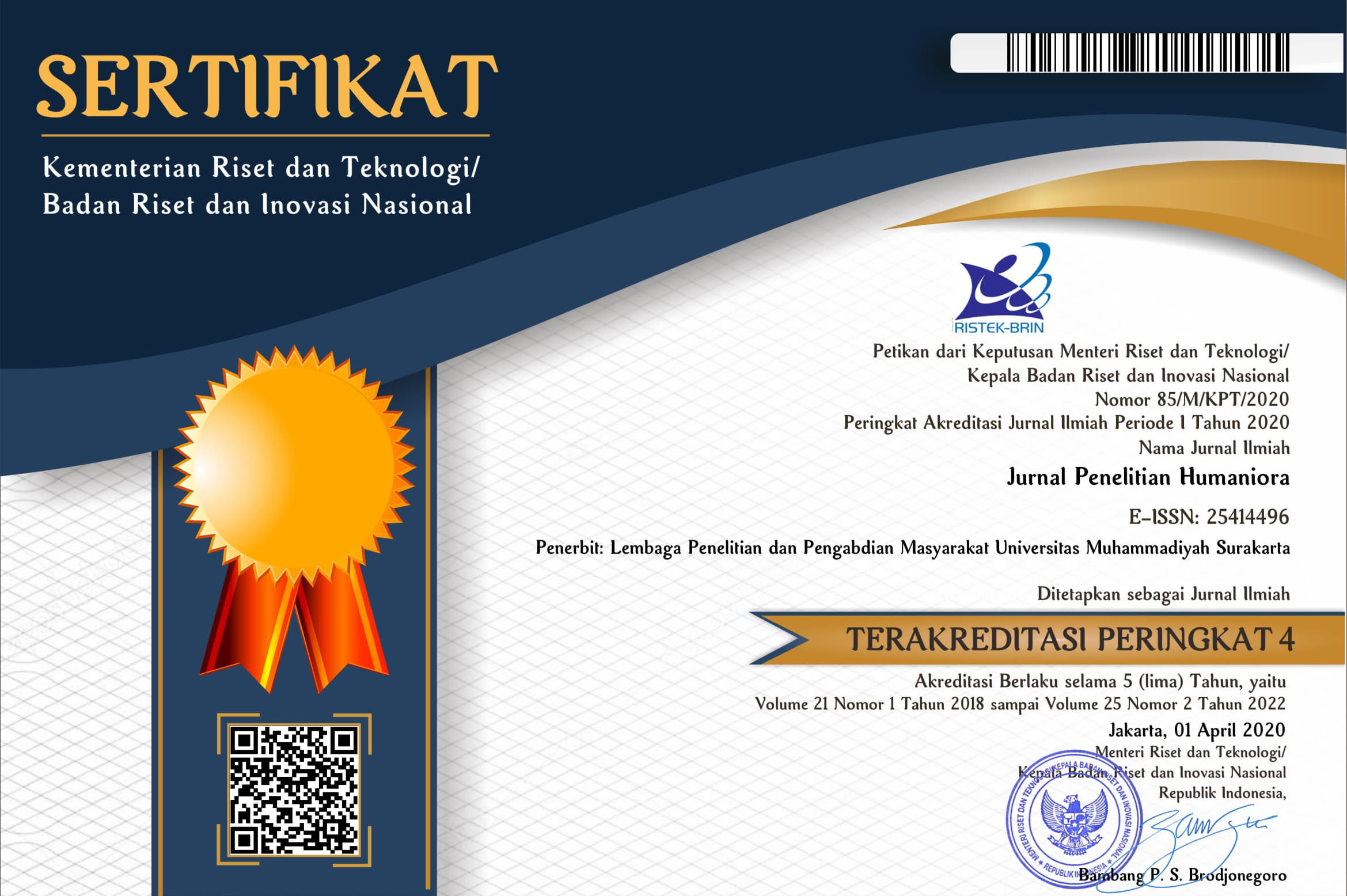Types and Causes of Students’ Disruptive Behaviors in English Class: A Case Study at Dondaeng Secondary School, Laos
Phoumchay Vongvilay(1*), Endang Fauziati(2), Koesoemo Ratih(3)(1) Universitas Muhammadiyah Surakarta
(2) Universitas Muhammadiyah Surakarta
(3) Universitas Muhammadiyah Surakarta
(*) Corresponding Author
Abstract
Keywords
Full Text:
PDFReferences
Charles, C. M. (1999). Building classroom discipline. (6th Ed.). New York: Longman.
Glasser, W. (1998). Choice theory: A new psychology of personal freedom. New York: Harper Collins.
Istianatul. (2019). Teacher’s Strategies in Handling Students’ Misbehavior in English Class of Junior High School 22 Surabaya. A Thesis. English Teacher Education Department, Faculty of Education and Teacher Training, Sunan Ampel State Islamic University Surabaya.
Madison, J. (2011). Disruptive classroom behavior. The university of Delaware and Virginia Teach
McMillan, J. (2008). Educational Research. Fundamentals of the Consumer (5th Ed.). Virginia Commonwealth University. NY: Pearson Education Inc.
Merrett, F., & Wheldall, K. (1986). Observing Pupils and Teacher in Classroom (OPTIC): A behavioral observation, schedule for use in school. Education Psychology, 6(1), 57-70. https://doi.org/10.1080/0144341860060107
Miles, M. B. & Huberman, A. M. (1984). Qualitative data analysis. London: Sage.
Nasucha, Y., Sabardila, A., & Pratiwi, D. R. (2019). Identifikasi Bentuk Pembinaan Sekolah Terhadap Siswa dengan Perilaku Juvenile Delinquensi. Jurnal Penelitian Humaniora, 20(2), 98-104.
Nuray GÜLEÇ. (2014). Disruptive Student Behaviors in University Preparatory Classes Observed by Teachers of English .International Journal of Language and Literature, 3(2), 56.https://doi.org/10.23887/ijll.v3i2.20838.
Reed, D. F., & Kirkrpatrick, C. (1998). Disruptive students in the classroom: A review of the literature. Metropolitan Educational Research Consortium, Richmond, VA, USA
Rehman Ghazi, S., Shahzada, G., Tariq, M., & Qayum Khan, A. (2013). Types and Causes of Students’ Disruptive Behavior in Classroom at Secondary Level in Khyber Pakhtunkhwa, Pakistan. American Journal of Educational Research, 1(9), 350–354. https://doi.org/10.12691/education-1-9-1.
Richard, J. C. & Renandya, W. R. (2002). Methodology in language teaching: An anthology of current practice. Cambridge University.
Setyadi, Y. B., Anggrahini, T. O., Wardani, N. P. K., Yunanto, W. N., Setiawati, O. T., Hidayati, G. N., ... & Nugroho, I. (2020). Penerapan Budaya 5S sebagai Penguatan Pendidikan Karakter Siswa di MTs Muhammadiyah 9 Mondokan, Sragen. Buletin KKN Pendidikan, 1(2), 70-76.
Sufahmiat, S. (2015). Students’ Disruptive Behavior in Learning English. Jurnal Studi Guru Dan Pembelajaran, 2(3), 241–245. https://doi.org/10.30605/jsgp.2.3.2019.47
Sun, R. C. F., & Shek, D. T. L. (2012). Student classroom misbehavior: An exploratory study based on teachers’ perceptions. The Scientific World Journal, 2012. https://doi.org/10.1100/2012/208907
Suprehatiningsih, C. S. (2015). Classroom Management in English Class of Pangudi Luhur Elementary School Yogyakarta. Yogyakarta: Sanata Dharma University
Wisethrinthong K., Sirisuthi C., & Weangsamoot V. (2012). The development of classroom management system for the educational extension schools. European Journal of Social Sciences, 30(2), 313-320.
Article Metrics
Abstract view(s): 2845 time(s)PDF: 4340 time(s)
Refbacks
- There are currently no refbacks.











